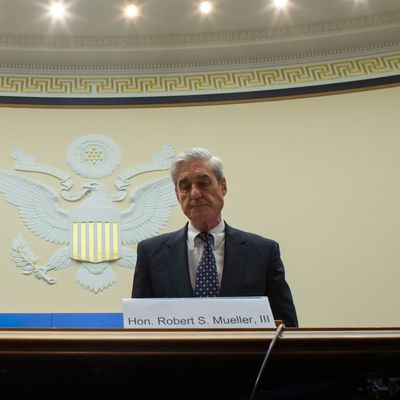
Robert Mueller’s performance in two House hearings must have badly shaken the bipartisan cult that had grown around him for two years. Even accounting for the difficulty of precisely answering verbal questions about long text in real time, Mueller looked halting, uncertain, leaning heavily on broad refusals to engage questions he didn’t like while still managing to commit an important error requiring correction. (He stated he would have indicted Trump if not prevented from doing so by an old Department of Justice policy, then later retracted that line to say he “would not reach a determination ― one way or the other ― about whether the president committed a crime.”)
Republicans seized immediately upon the very mortal performance of their endlessly lionized nemesis to suggest he had been led around by the nose all along by his aggressive underlings. “He is feeble,” declared Mark Levin. “This underscores that the person who influenced this investigation most was Andrew Weissmann, his top lieutenant.” Mueller “wasn’t in charge,” a Republican tells Byron York.
But another, more sensible interpretation is that Mueller did direct the broad contours of the investigation. He limited its scope and aggressiveness by imposing his cautious, institutionalist instincts, a strategy the two hearings placed on glaring and often uncomfortable display.
Mueller’s investigation made several conservative choices. He failed to bring charges against every subject he had evidence again (even Jerome Corsi, who lied to federal investigators and expected to be indicted, was not prosecuted). He declined to subpoena Trump to force him to sit for an interview, rewarding the president’s hardball tactics. He did not highlight Trump’s public dangling of pardons, which persuaded Roger Stone and Paul Manafort to stonewall the probe, as obstructive acts. Most important, Mueller decided not only to follow a Nixon-era Department of Justice guideline against indicting a sitting president, he further concluded that he could not even say he would have charged Trump with a crime if he could.
Democrats tried fruitlessly to lead Mueller to his own conclusions. Two Democrats on the Judiciary Committee, Hakeem Jeffries and Ted Lieu, walked the witness through the three stated elements of an obstructive act defined in the Mueller report: an obstructive act, a nexus with an official proceeding, and corrupt intent. Jeffries went sequentially through the elements, getting Mueller to agree that Trump’s actions had fulfilled each one.
But then Mueller interjected, “Let me just say, if I might, I don’t subscribe necessarily to your — the way you analyzed that. I’m not saying it’s out of the ballpark, but I’m not supportive of that analytical charge.” He agreed that it was 1 + 1 + 1, but would not agree that it added up to 3. He was not denying, it either — merely hewing to his ultrafastidious conception of a uniquely constrained prosecutor who could lay out the constituent pieces of a crime but could only leave it to Congress to name the final product.
This was a key vulnerability Republicans used against Mueller in his hearing. Despite the copious evidence he produced, the lack of a bottom-line conclusion allowed Republicans to define it as exoneration and dare Mueller to disagree. Over and over, they put him in the position of either declaring that Trump had committed crimes or having to admit the president had been treated unfairly — knowing full well that Mueller’s self-imposed constraints would never allow him to do the former.
“The bedrock principle of our justice system is a presumption of innocence. It exists for everyone. Everyone is entitled to it, including sitting presidents,” argued Texas representative John Ratcliffe. “Can you give me an example other than Donald Trump where the Justice Department determined that an investigated person was not exonerated because their innocence was not conclusively determined?”
Of course, there’s no other such example — because there’s no other person who is deemed immune from prosecution.
Wisconsin representative Jim Sensenbrenner insisted, “Since you decided under the OLC opinion that you couldn’t prosecute a sitting president, meaning President Trump, why do we have all of this investigation of President Trump that the other side is talking about when you know that you weren’t going to prosecute him?” Mueller’s decision not to charge Trump with a crime, he reasoned, meant that Mueller had no right to conduct a criminal investigation at all. And while the implication of his logic is that the president is completely immune from any legal constraints, his logic holds together more tightly than the tortured rationale Mueller had constructed.
Sensenbrenner, amazingly, cited the example of Ken Starr, the right-wing moralist who used his independent counsel position to crusade for Bill Clinton’s impeachment, as an example Mueller should have followed. “You didn’t use the word ‘impeachable conduct’ like Starr did,” he said. “There was no statute to prevent you from using the words ‘impeachable conduct.’”
Mueller’s attempt to place himself above the fray, by refusing to call a crime a crime or to recommend impeachment, became the Republicans’ best evidence against him. His caution allowed a series of Republicans, beginning with William Barr, to mischaracterize his findings. And when he contradicted their lie, they accused him of smearing Trump.
Republicans used Mueller’s caution and occasional uncertainty to discredit all the damning facts he produced. In fact, it suggests the opposite point: Mueller did not chase down every possible lead or rule out every possible crime. He never got to the bottom of the nature of the contacts between the two Trump advisers, Stone and Manafort, who worked with Russian cutouts during the campaign.
Perhaps Mueller was outwitted, or at least outwilled, by Trump. What does that tell us? That Trump got away with even more than we think.






























